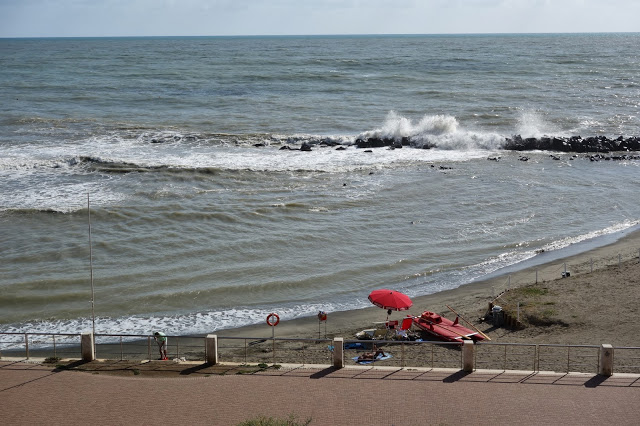On Friday, the Ohio Education Association Representative Assembly elected my friend Becky Higgins to be OEA’s next President. Some mutual friends have encouraged me to post a few thoughts, and I’m happy to do so.
Most of the readers of this blog are educators, most of those are OEA members, and most of those are North Eastern OEA members; but if you’re not one of those and you run across this blog and wonder what in the world all the fuss is about, I’ll try to explain that too. The OEA presidency matters here because OEA is Ohio’s largest union and largest education organization. But its influence goes beyond our borders because Ohio has become a pivotal state, in both national political campaigns and all the ideological issues at play throughout the country.
To get to the statewide battle, Becky had to win a “primary” at NEOEA’s fall Representative Assembly. Last fall, Becky and André Taylor ran a spirited campaign as friends and competitors, and NEOEA’s delegates chose Becky to advance to the state contest. By then, valuable time had been lost in starting the statewide campaign, and it’s probably fair to say that Becky started the statewide campaign as an underdog.
After all, her opponent, Bill Leibensperger, was OEA’s sitting Vice President. He had served an apprenticeship as OEA Secretary-Treasurer and Vice President covering twelve of the last thirteen years. Since OEA, like many organizations, frequently elevates sitting Vice Presidents to the Presidency, a lot of smart people regarded him as the prohibitive favorite.
So why did Becky win? (Notice, I didn’t ask “how”: I suspect that insiders on both sides have already begun formulating answers to that question.)
I don’t think it was because of dissatisfaction with Bill’s performance as Vice President. During the Senate Bill 5 repeal (the historic 2011 defense of Ohio public-employee collective bargaining rights), Bill had met privately with representatives of Ohio’s governor, and he had been criticized widely for that. Bill posted a defense of his actions online, but Becky didn’t use the incident as an issue in her campaign.
I don’t think it was because of NEOEA’s numeric superiority. Neither NEOEA nor Central OEA/NEA (Bill’s district association) has enough delegates to carry an election without winning over significant numbers of delegates from other parts of the state.
So if those things weren’t part of the picture, what was? I think it comes down to three things: first, Becky herself; second, campaign style and substance; and third (surprisingly, perhaps), experience.
First: people who have worked with Becky have found that she is approachable and kind, yet tough and knowledgeable. And I think that those qualities came across even among people who doubted her credentials. As OEA’s President, I think she’ll benefit from members’ good will–even from members who didn’t support her candidacy.
Second: I think the campaigns had something to do with it. OEA campaigns have often been based on candidates’ résumés, connections, and personalities, not so often on actual issues. This isn’t surprising: in organizations like OEA, candidates frequently agree on most issues, and voters have to base their decisions on something. But Becky ran an unusually substantive campaign, publishing weekly position papers on critical issues. (You can read them at beckyhiggins4oeapresident.wordpress.com.) Those “Weekly Issues” may have convinced people that Becky had a good grasp of OEA’s situation and should be considered seriously as a candidate. Bill never really seemed to match that level of detail.
Finally, Becky was able to cite her experience as a local and district President. In questions from the delegates, Becky pointed out that presidents face situations and decisions that other officers don’t face. Bill pointed out that he comes from a large local and a district association that don’t change their presidents very often, so the opportunity to show what he could do as a president wasn’t open to him. A lot of the RA delegates are local presidents, and other delegates consider their presidents’ opinions when casting their own votes: I suspect that local presidents may have found Becky’s argument to be persuasive.
My own hope is that this contest has permanently raised the bar for these campaigns: that OEA delegates will expect more substance from future candidates for Association office, and that that expectation will trickle down to district associations and locals. I hope that delegates will have a better idea of what sort of experiences to look for in future candidates.
I also hope that within OEA, we will learn that the best use of Ohio’s unique district structure is not to form voting blocs but to give potential leaders an opportunity to demonstrate what they can do.
But most of all, I hope that delegates and members come to realize that sincerity, humility, and openness, when coupled with intelligence, toughness, and drive, can form a basis for effective leadership. That’s what I think Becky Higgins will show us in the years ahead.
(A disclaimer: Nothing here is any sort of official statement from NEOEA, and nothing here is based on insider information; it’s based on my own personal observations of this election as it took shape and was eventually decided, and the opinions and observations offered here are my own.)

